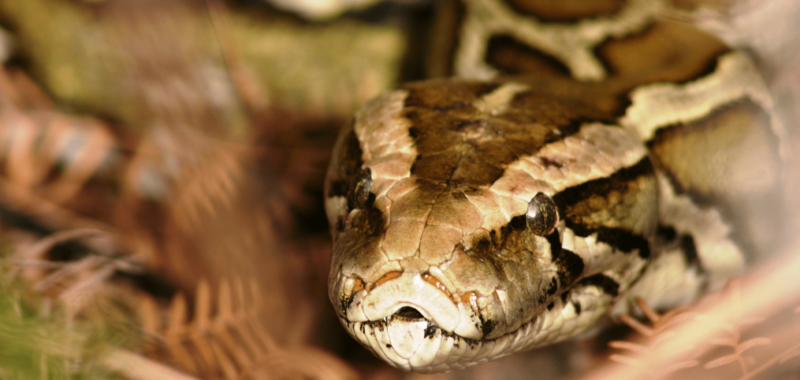Today is the first day of The Florida Python Challenge, where snake hunters will wade into the Everglades to track down invasive Burmese pythons. Up to $25,000 in prizes are up for grabs during this annual 10-day challenge from the Florida Fish and Wildlife Conservation Commission.
In 2000, Burmese pythons were first identified in Everglades National Park. According to the United States Geological Survey (USGS), they were either intentionally or accidentally released by people who owned them as pets.
Since then, the enormous reptiles have quickly become one of the most destructive foreign species in the park’s history. The population has only continued to grow and it now occupies most of southern Florida. Burmese pythons can grow to over 18 feet long and weigh over 200 pounds. A female Burmese python can lay up to 50 to 100 eggs at a time, and they have thrived in the Everglades’ humid tropical to subtropical climate.
[Related: Scientists propose eating more python.]
Since they eat a wide range of animals, they have greatly altered the food web and ecosystems across the Greater Everglades. A 2023 review from the USGS, found that the snakes have contributed to the declines of possums, bobcats, foxes, cottontail rabbits, and raccoons. The odds of eradicating them once they spread across a large area are very low.
“The iconic Everglades is a national treasure and the Florida Python Challenge is a great way to get the public involved in understanding the unique Everglades ecosystem. Removing invasive pythons from across the Greater Everglades Ecosystem is critical, and we must do everything we can to combat this invasive species,” South Florida Water Management District Governing Board Member “Alligator Ron” Bergeron said in a statement.
The hunt begins today and ends at 5 p.m. local time on Sunday, August 18. The goal is to humanely kill as many Burmese pythons as possible. The species is not protected in Florida, but anti-cruelty law still applies in this situation. Firearms are not allowed in the challenge. The Florida Python Challenge outlines an approved two-step process for killing the snakes, which includes using a captive bolt and ensuring that the snakes remain unconscious during the procedure.

The 2023 challenge brought in 209 pythons. Over the next 10 days, hunters will use designated areas that span western Broward County to the Tamiami Trail in the Big Cypress Wildlife Management Area. Other spots include Southern Glades, Holey Land, and Rotenberger. There is both in-person and online training on how to identify these snakes.
The top prize of $10,000 will be awarded to the individual who catches the most pythons. There are three general categories–Novice, Professional, and Military. The person who catches the most pythons in each of these categories will win $2,500, with the runners-up receiving $1,500, The person who catches the longest python will win $1,000.
The South Florida Water Management District and the state began hiring contractors to handle the issue year round in 2017. Since then, more than 11,000 pythons have been removed, with 2,200 removed in 2023 alone. The heaviest python contractors have caught was a female that weighed 215 pounds and was close to 18-feet-long. It was caught by Conservancy of Southwest Florida biologists in 2022.
[Related: Why are there so many snakes?]
Former state contractor and self-named “Python Huntress” Amy Siewe won the 2023 prize for longest python. She caught a snake that was 10 feet and 9 inches long. She will not be participating this year due to a knee surgery. She told the Associated Press that she is not a fan of this annual challenge, as it has started to draw large crowds that are possibly scaring off pythons and hunters may be killing native snakes–including cottonmouths, corn snakes, and brown water snakes–that they mistake for pythons.
“Pythons don’t take on their normal behavioral pattern because there’s so much traffic and they’ll come up and then they’ll go back into the swamp,” Siewe told AP. “I feel for myself, it’s counterproductive.”

